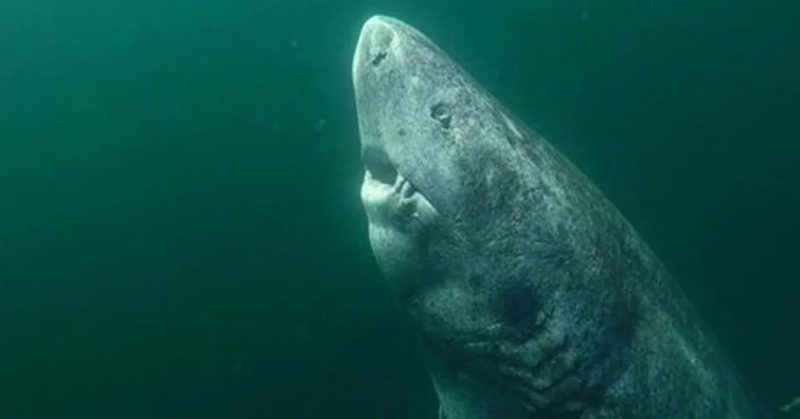Just when you think mother nature can’t bring you any more surprises, we learn that there are animals alive today that were born centuries ago. In 2016 scientists discovered a 400-year-old shark – and she’s not the only one. (1)
The 400-Year-Old Shark in Greenland
Marine biologists have known for years that Greenland Sharks live for a very, very long time. Until just a few years ago, however, they had no way of figuring out just how old they were. Now, by testing something in their eyes, they can. (1)
Four years ago they used this method and found what they determined to be a 400-year-old shark. Based on their study, they now believe that Greenland sharks can live to at least 272 years and possibly up to 500, making them the oldest vertebrates on earth. (1)
Difficult to Age
Greenland sharks are elusive by nature and also live in a rather remote habitat. They swim very slowly through the deep waters of the North Atlantic Ocean. This has made them harder to study than other types of sharks. (2)
From the research already done on the animals, scientists knew the sharks grow incredibly slowly at a rate of just half an inch every year. Comparing this to the size of adult sharks was able to give them some idea of just how long they need to live to reach that size. (2)
What previously made determining the sharks’ ages so challenging was their lack of hard, calcified tissue. Fish have ear stones, called otoliths, that can be examined in a similar way to the rings of a tree. Other sharks have a similar type of calcified tissue in their spinal cord. (2)
The Greenland Shark has no hard body parts where growth layers are deposited. (2)
Read: Fish recorded singing dawn chorus on reefs just like birds
Age is in the Eyes
The research team discovered that the Greenland shark’s eye lens is made up of a specific material that contains metabolically inert proteins. These proteins are not renewed after they are synthesized by the body. This means they can isolate the tissues formed when the sharks were just pups and perform radiocarbon dating. (2)
The 400-Year-Old Shark Study
The research team, whose study was published in Science magazine, looked at 28 sharks that passed away accidentally. Of those 28 sharks, they found one particularly advanced female. (2)
Radiocarbon dating cannot produce exact dates, so they believe that this female shark was as young as 272 years old up to a possible 512. This means she would have been born between 1501 and 1744. (2)
Scientists say, she was most likely a 400-year-old-shark. (3)
“Even with the lowest part of this uncertainty, 272 years, even if that is the maximum age, it should still be considered the longest-living vertebrate,” said lead author marine biologist Julius Nielson from the University of Copenhagen. (2)
A Problem for Conservation
Due to their slow growth rate, biologists believe that Greenland Sharks don’t reach sexual maturity until the age of 150. This makes them extremely vulnerable. The animal is still struggling to recover from overfishing during World War II when their livers were used to make machine oil – that is, until a synthetic version was invented. (2)
Currently, it is rare to find sexually-mature females and very few newly-born pups or juveniles. (2)
“It seems most are sub-adults. That makes sense: if you have had this very high fishing pressure, all the old animals – they are not there any more. And there are not that many to give birth to new ones.” explained Nielson. “There is, though, still a very large amount of ‘teenagers’, but it will take another 100 years for them to become sexually active.” (2)
The Bottom Line
Currently, the population of these incredible creatures is unknown. If it is not very big, the species could be in big trouble: Even the death of one of these long-lived 400-Year-Old Sharks could mean a big loss. (1)
Between accidentally being caught during fishing and climate change, Greenland Sharks could be under serious threat. This means how we manage and conserve the Arctic and deepwater ecosystems are extremely important. (1)
“It’s important for policymakers to keep in mind that this is an extremely long-lived and slowly maturing animal.” says Nielson. “Fisheries should do what they can to minimize bycatch. We need to have some respect for them.” (1)
Read: Two-headed mutant shark is discovered by fishermen

